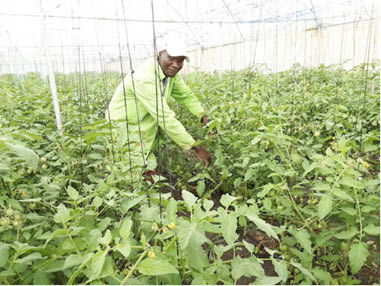Ruth Mbabazi Otieno, a farmer with a bachelor’s degree in Mass Communication and a masters in Development Studies, has proven that even in a more challenging setting a farmer can discover methods to innovate and make money.
The mother of four, who has been farming as a business and as a hobby for many years, is today an employer of labour and the Chief Executive Officer (CEO) of Tech Growers Max Ltd in Joska, Kenya.
The greenhouse farmer grows various kinds of vegetables roughly 34 kilometres from Nairobi, Kenya’s capital.
Joska, a semi-arid peri-urban municipality, is a place where a farmer will have to think twice before establishing a farm because it receives little to no rain throughout the year, but Ruth has shown that if one is determined to succeed, obstacles may become benefits.
When asked how the idea of investing in a greenhouse vegetable production came about, she told Daily Trust that, “I was looking at a way to improve my livelihood and to feed my family with the food that I am sure about how it is grown.”
When comparing where she started and where she is now, Ruth said that working with other experts and learning from other farmers were two of the most important lessons she had learnt.
Unlike many farms that suffered and eventually collapsed in Nigeria because owners do not have time to visit and learn from the experience of others or engage professionals who have the technical know-how and expertise to provide assistance, she said doing so helped strengthen her farm.
She said, “Key lesson is that you have to know what you want and also work with both professionals and people who have experience in farming.” The farmer has introduced a number of innovations that assist her in overcoming production-related difficulties, even though the high input costs have a significant negative impact on the farm’s returns. Despite this, she remains unwavering in her determination to succeed.
She said, “We are not yet there, but we are somewhere.”
What the farm produces
Ruth uses a drip irrigation system with a solar-powered borehole to water five acres where she grows high-value vegetables and spices that not only increase her income but also provide permanent and seasonal jobs for locals during the peak of each harvest season.
Since 2016, Ruth, through her farm has been cultivating vegetables like coriander – an aromatic and antioxidant herb with a variety of culinary uses and health advantages, some of which experts have identified as including reduced blood sugar by enhancing the activity of an enzyme that aids in removing sugar from the blood.
The farm also produces French bean, which is known by many common names, including green bean in Nigeria. Also on the farm are varieties of tomatoes both in the greenhouse and in the open field.
The farm’s managers, Paul Lusweti and Stephen Nyamau, attested that harvest had been good even though it might not be the same every season.
Mr Lusweti, who has been working with Ruth since the establishment of the farm, said the spinach grown on the farm was one of the best in the region.
In addition, the farm produces collard – a kind of cabbage that is highly suggested for diabetics and high cholesterol patients; capsicum, also known as red pepper or chili pepper; onion and other vegetables that are commonly consumed in many households.
To keep productivity at optimum level, the farm practices crop rotation.
Despite being located in a peri-urban area, Ruth described the market for fresh vegetables as “good”, adding that, “The market for veggies is highly available, though in a few instances there is flooding in the market, but most of the time the market is good.”
Although she didn’t plan the farm with the solar system in mind, the difficulties she faced made it an afterthought.
She explained that, “The solar system was an afterthought after facing challenges with electricity power supply, and also the price of electricity bills. It wasn’t making any economic sense.”
She now provides water to nearby homes regularly.
Despite the lack of assistance from the government and other organisations, Ruth looks within to provide food and income not just for her family, but also for those who labour with her.
With this, Nigerian women can likewise take advantage of the country’s enormous vegetable industry, which Statista projects will expand by 13.75 per cent (2023-2028) and reach a market volume of $45.0bn in 2028. Nigeria has five unique agro ecological zones that offer enormous potential for the country’s agriculture.
Aghan Daniel, a seasoned agriculture, health and environment Kenyan journalist and communication expert, said Ruth’s story should inspire many women on the continent to use agriculture as a means of eradicating poverty and ensuring food insecurity – the first and second goals of the UN’s Sustainable Development Goals (SDGs).

 Join Daily Trust WhatsApp Community For Quick Access To News and Happenings Around You.
Join Daily Trust WhatsApp Community For Quick Access To News and Happenings Around You.

